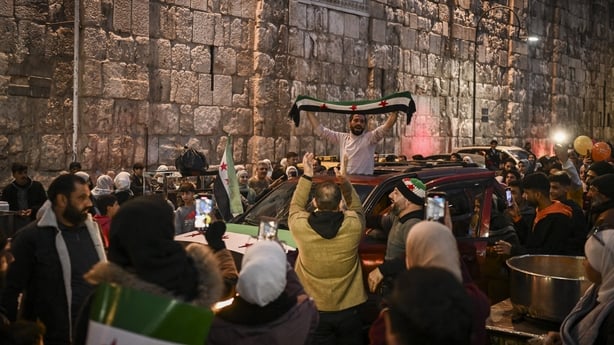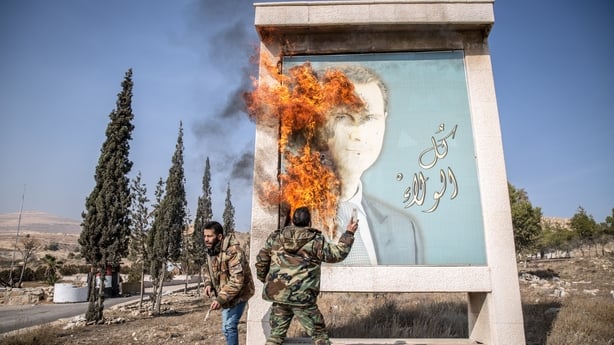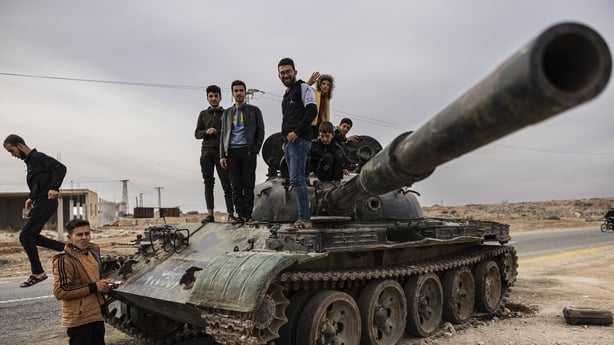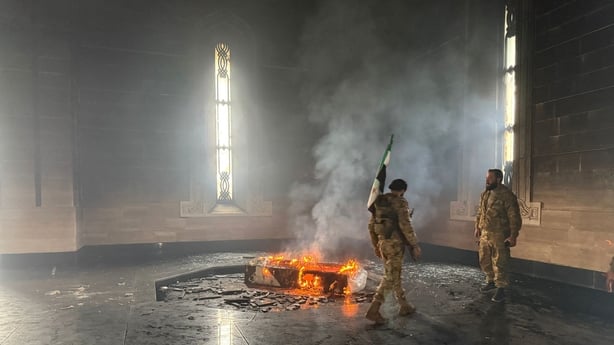The main commander of the fighters who toppled Syria's president Bashar al-Assad said that he would dissolve the security forces of the former regime, close its prisons and hunt down anyone involved in the torture or killing of detainees.
Rebel leader Ahmad al-Sharaa - better known as Abu Mohammed al-Golani - said in a statement he will "dissolve the security forces of the previous regime and close the notorious prisons".
Syria ran one of the most oppressive police states in the Middle East during five decades of Assad family rule.
Mr Sharaa, whose former al Qaeda affiliate Hayat Tahrir al-Sham (HTS) is now the country's most powerful force, must balance demands for justice from victims with the need to prevent violent reprisals and secure international aid.
Syrians have flocked to the infamous prisons where the Assad regime is estimated to have held tens of thousands of detainees,desperately looking for their loved ones.
Some have been released alive, others were identified among the dead, and thousands more have not yet been found.
We need your consent to load this rte-player contentWe use rte-player to manage extra content that can set cookies on your device and collect data about your activity. Please review their details and accept them to load the content.Manage Preferences
Mr Sharaa said in a separate statement on the Syrian state TV's Telegram channel that people who took part in the torture or killing of detainees would be hunted down, and pardons were out of the question.
"We will pursue them in Syria, and we ask countries to handover those who fled so we can achieve justice," said Mr Sharaa.
The world is carefully watching to see if Syria's new rulers can stabilise the country and avoid unleashing violent revenge,after a 13-year civil war fought along sectarian and ethnic lines.

Mohammad al-Bashir, the man installed by Mr Sharaa's fighters to lead an interim administration until March, said he aimed to bring back millions of refugees, create unity and provide basic services.
However, the new administration has scant resources, he told Italian newspaper Il Corriere della Sera.
"We have no foreign currency and as for loans and bonds we are still collecting data. So yes, financially we are very bad," said Mr Bashir, who previously ran a small rebel-led administration in a pocket of northwestern Syria.
Rebuilding Syria is a colossal task following the civil war that killed hundreds of thousands of people, reduced cities to ruins and left the economy gutted by international sanctions.
Millions of refugees still live in camps after one of the biggest displacements of modern times.
Engaging warily
Foreign officials are warily engaging with the former rebels, although HTS remains designated a terrorist organisation by the US, the United Nations, EU and others.
The new government must "uphold clear commitments to fully respect the rights of minorities, facilitate the flow of humanitarian assistance to all in need, prevent Syria from being used as a base for terrorism or posing a threat to its neighbours," US Secretary of State Antony Blinken said.
In addition to terrorism bans in place against the former rebels, Syria also remains under US, European and other financial sanctions imposed against Damascus under Assad.

Two senior US congressmen, a Republican and a Democrat, wrote a letter calling for the US to suspend some sanctions.
The most punishing war-time American sanctions are up for renewal this month, and the former rebels have told Reuters they are in touch with US about potentially easing them.
With the administration of US President Joe Biden entering its final weeks in office, Mr Blinken and US national security adviser Jake Sullivan headed to the Middle East to work on a Gaza ceasefire and help ensure a smooth transition in Syria, US officials said.
Their separate itineraries include stops in Jordan, Turkey, Israel, Qatar and Egypt.
For refugees, the prospect of returning home has brought a mixture of joy and grief over hardship in exile.
Syrians lined up at the Turkish border to head home, speaking of their expectations for a better life following what was for many a decade of hardship in Turkey.
Dozens more Syrians were waiting to cross.

Countries hope the new authorities' behaviour will make it possible to ease wartime sanctions imposed on Damascus under Assad, as well as the terrorism bans imposed on the rebels who toppled him.
Two senior US congressmen, a Republican and a Democrat, wrote a letter calling for the US to suspend some sanctions.
The most punishing war-time US sanctions are up for renewal this month, and the former rebels have told Reuters they are in touch with the US about potentially easing them.
The new government has told business leaders it will adopt a free-market model and integrate into the global financial system after decades of state control, the head of the Damascus Chambers of Commerce, Bassel Hamwi, told Reuters.

The world will be watching closely to see whether Syria's new rulers can avert revenge attacks following a brutal civil war and decades of repression.
In his first brief address on state TV, new interim prime minister Bashir appeared in front of two flags: the green, black and white flag flown by opponents of Assad throughout the civil war alongside a white flag with the Islamic oath of faith in black writing, typically flown by Sunni Islamist fighters.
A resident of Assad's family hometown of Qardaha said Sunni Islamist fighters had torched the mausoleum of Assad's father Hafez over the past two days, instilling fear among villagers from Assad's Alawite sect who had pledged cooperation with the new rulers.
Russia, Assad's close ally which has granted him asylum, warned about the prospect of a return of Islamic State, the jihadist group that established a violent mini-state in swathes of Syria and Iraq from 2014-2017.
UN chief sees hope in Syria after end of Assad regime
United Nations Secretary-General Antonio Guterres said there were signs of hope in Syria following the overthrow of President Bashar al-Assad by rebel forces over the weekend.
"As we speak, we are witnessing the reshaping of the MiddleEast ... We also see some signs of hope, and signs of hopenamely coming from the end of the Syrian dictatorship," Mr Guterres said during a visit to South Africa.
Mr Guterres said that the United Nations was committed to a smooth transition of power in Syria.
"It's our duty to do everything to support different Syrianleaders in order to make sure that they come together, they are able to guarantee a smooth transition, an inclusive transition in which all Syrians can feel that they belong," Mr Guterres told reporters.
"The alternative doesn't make any sense," the UN chief added.

